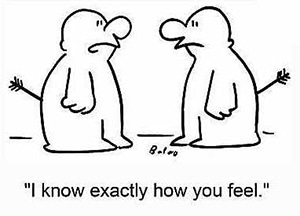How Well Do You Practice Empathy?
 Last month we talked about ways that we can better talk to ourselves. Did you make some break-throughs? I hope so! If you didn’t get a chance to read it, just click here.
Last month we talked about ways that we can better talk to ourselves. Did you make some break-throughs? I hope so! If you didn’t get a chance to read it, just click here.
This month we’re taking it a step further and finding out if we are empathetic or if there needs to be some improvement there. All of these little steps are getting us closer to BE-ing the kind of person that is opened to all the goodness available to us and using it to help others too – a place of true abundance.
Empathy—that quality of recognizing and understanding another person’s desires, beliefs and emotions—is one of the most important skills we can ever acquire. It fosters meaningful relationships, reduces prejudice and negative assumptions, encourages honest communication and can help avert violence. Studies have found that people high in empathy are more confident, sensitive and assertive, and they enjoy better physical and mental health. Often described as standing in another person’s shoes or looking through the other’s eyes, empathy connects us human-to-human.
Take this quiz to see how well you practice empathy.Answer True or False to each set of questions.
Set 1
1. If I don’t know enough to understand, and empathize with, another’s dilemma, I try to increase my knowledge by asking questions.
2. I recognize and remember that others are different from me and might see and feel things differently from how I might experience the same situation. I try to look at the situation through that person’s eyes, not my own.
3. I don’t need to be right about what I imagine the other person to be feeling. If I’ve misunderstood, I ask the person to help me correct my impressions. Doing so helps me learn more about the other.
4. When I show that I understand the other person’s experience, I notice that the person I’m talking with opens up more.
5. My irritation with another person often dwindles when I understand what’s going on inside him or her.
6. Being a good, active listener helps me “get” what someone else is going through.
7. I try to focus on the other person’s feelings, rather than on actions or circumstances. I know that when people are upset, it’s better to work through and handle their feelings before figuring out how to solve their problems.
Set 2
1. If a friend complains about a boss at work, I’m likely to advise that person to find another job, change departments or speak up. I like to be helpful by offering solutions.
2. I’m always ready to offer a psychological analysis of my friends’ troubles.
3. If a co-worker expresses anxiety about her relationship with her husband, I’m quick to reassure her that all couples have their little problems, and that she shouldn’t worry about it.
4. It seems that I always know better than my friends what’s behind or underneath their problems.
5. When family members are upset about something, I find a way to distract them or change the subject.
6. I’m quick to remind people that plenty of others are a lot worse off than they are.
7. When empathizing with others, I imagine how I would feel in a given situation and assume the same would be true for them. We’re all basically the same, aren’t we?
True empathy can only occur when we have successfully shed all preconceived ideas and judgments about others—and when we’re comfortable with others’ deep feelings. If you answered true more often to the second set than the first, you may benefit from learning more about how to respond with empathy, how to really hear someone. It’s one of the greatest gifts you can give another person.
How have you shown more empathy to those in your life? What do you feel you may need to work on? How have you seen empathy in your life? Share your thoughts with us in the comments!
Author’s content used under license, © Claire Communications

Leave a Reply
Want to join the discussion?Feel free to contribute!